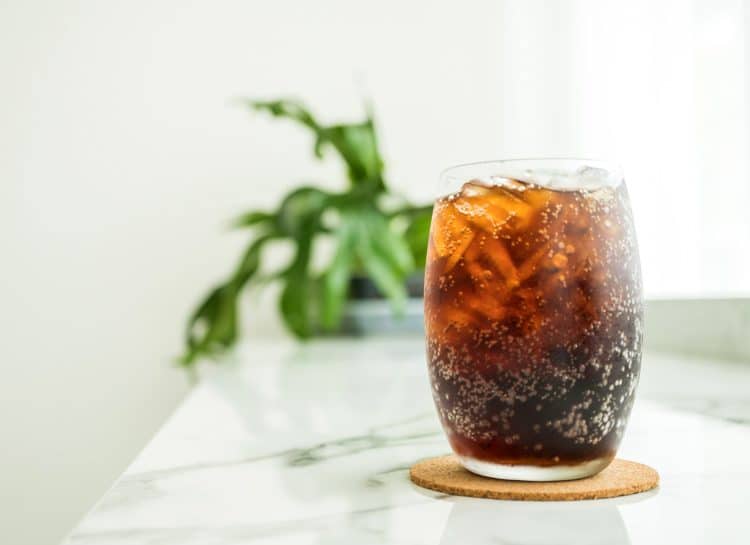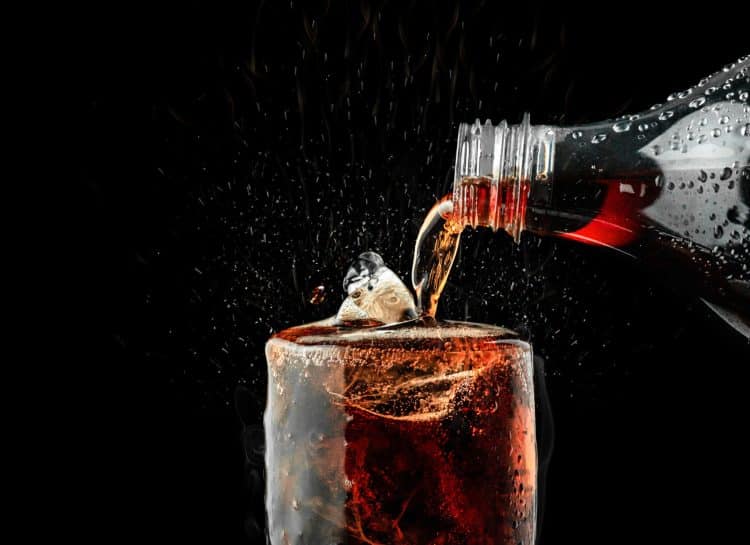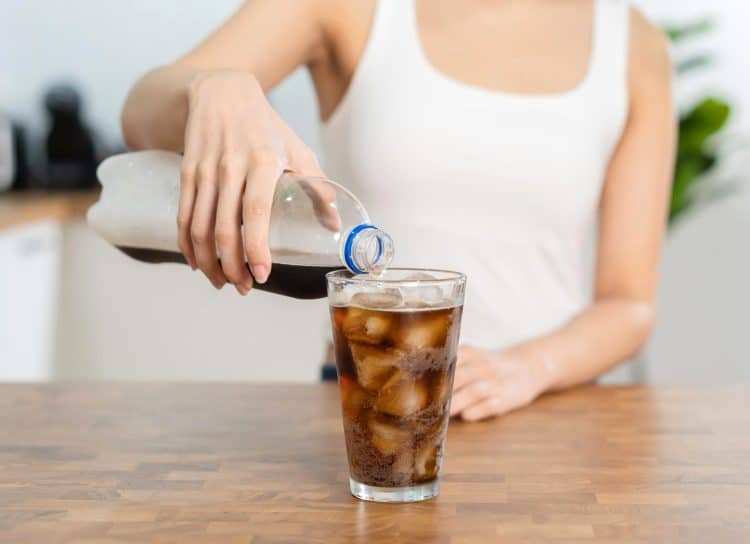Intermittent fasting is gaining popularity due to its manifold health benefits. A highlighting reason behind this popularity is that you do not have any restrictions while eating, and you can have calorie-free beverages in the fasting window. Since they do not contain calories, many people like having diet sodas while fasting to improve their mouth taste and kill their cravings. Around one-fifth of the American population consumes diet drinks on any given day. [1]
Technically, you could have diet soda while fasting since it does not contain protein or calories. But there is more to diet soda that you need to know before making it part of your intermittent fasting routine.
Why do you fast? Most people do it for weight loss, gut rest, or specific health benefits. Unfortunately, consuming diet soda helps achieve nothing and harms your health in more ways than one. The reasons for this are hidden in the composition of diet soda which we will discuss below.
What is Diet Soda?
These popular beverages contain artificial sweeteners instead of regular sugar. Diet soda is mainly marketed to people who follow a dieting plan and do not wish to consume empty calories. A few popular diet soda brands include Diet Dr. Pepper, 7Up Zero Sugar, Zero Coke, Diet Coke, Sprite Zero, and Diet Pepsi Wild Cherry.

Diet Soda Ingredients
The diet soda ingredients might slightly differ depending on the type and brand of the soda you pick and the country you buy it from, but the broad list of ingredients used in diet soda includes:
- Carbonated or Sparkling Water: Sparkling water occurs naturally due to natural geological processes, while carbonated water is made artificially by combining carbon dioxide with water.
- Artificial Sweeteners: Common sweeteners in diet soda include acesulfame-k, aspartame, saccharin, cyclamates, plant-based sweeteners, or sucraloses such as Splenda and stevia.
- Added Colors: Carotenoids, caramels, and anthocyanins are the most common colors used in diet soda.
- Flavors: Fruits such as strawberry, citrus oils from orange or lemon, herbs, ginger, cola, berries, caffeine, and cinnamon are the most common flavors.
- Acids: If your diet soda has tartness, it might be infused with citric, tartaric, malic, or phosphoric acids.
- Vitamins and minerals: Some diet sodas have added vitamins and minerals to make them healthier.
- Preservatives: Potassium benzoate, potassium sorbate, and sodium benzoate are common preservatives used in diet sodas. Sodium benzoate is added to promote antimicrobial properties, sodium citrate is used as an acidity regulator, and sodium phosphate is added to preserve taste. Some diet sodas contain phenylalanine which suppresses hunger and produces neurotransmitters like dopamine, which can help improve mood.
Besides sodium (most diet sodas contain around two percent of the DV), there are no significant amounts of other nutrients such as fat, carbohydrate, cholesterol, fiber, vitamin D, iron, potassium, calcium, or protein in diet sodas.
What Nutritionists Say About Diet Soda
Per health experts, drinking a moderate amount of diet soda is acceptable. Most rodent studies are conducted with high dosages of sweeteners fed to them, which humans rarely consume. [2] However, excess diet soda can cause proclaimed long-term adverse effects.
Most nutritionists disapprove of diet sodas as they have no nutritional value and are nothing more than carbonated water full of artificial sweeteners.
Does FDA Approve Diet Soda?
The artificial sweeteners used in diet sodas are the primary cause of health concerns. However, most sweeteners used in diet sodas are approved by the FDA. The agency ensures that carbonated soft drinks maintain hygiene with properly labeled ingredients. [3]

Does Diet Soda Break a Fast?
Technically, diet sodas are okay to consume while fasting since these are calorie-free drinks that do not stimulate the mTOR, a protein kinase that regulates protein synthesis in response to nutrients.
However, if the purpose of your fast is to rest your gut or improve your metabolic health, then diet soda does no good to your body. The phenylalanine in diet sodas might stimulate the mTOR and break the fast.
Contrary to what dieticians believed earlier, sometimes diet sodas get absorbed in the blood when passing through the gut. The artificial sweeteners used in diet sodas interact with the gut microbiome and do not let the gut rest, which is the very purpose of a fast in most cases. [4]
A study indicates that chronic sucralose consumption could elevate insulin in adults. [5] It stops the fat burning process and ketone production. The body treats sucralose as sugar, signaling insulin release. A possible correlation of sucralose with weight gain is that since it is 200 times sweeter than sugar, consuming it may increase your preference for sweeter food items, leading to weight gain and defeating the whole purpose of fasting.
Lastly, the carbonated water and sweeteners alter the microbiota in the gut and increase water retention in the body, which seems more of a weight gain than loss.
How Much Diet Soda Can I Have While Fasting?
Drinking a can or two of diet soda a day is fine while fasting. Just make sure you don’t rely on it as a replacement for water. However, if your purpose of fasting is losing weight, reducing inflammation, inducing autophagy, entering ketosis, or just being more productive, it is best to avoid diet soda.
Where Can I Buy Diet Soda That’s Safe To Consume?
Irrespective of where you buy your diet soda from, you should carefully read the nutrition label to know what you are consuming and decide if it is safe or not.
People with genetic disorders such as phenylketonuria or mental illnesses should strictly avoid diet sodas with phenylalanine. Aspartame is bad for people who take medications such as neuroleptics and monoamine oxidase inhibitors or have a muscle movement disorder.
You should know that the diet coke you buy in the UK might have more caffeine than the usual quantity as the formulation can vary slightly in different countries.
Why We Need to Be Cautious About What We Drink While Fasting
Fasting needs a lot of patience and willpower. Even though most intermittent fasting plans do not restrict what you eat, you should still watch what you consume to get the full benefits of fasting. It is best to avoid drinks that do more harm than good. We will discuss a few healthy drinks that you can have in the later part of this post. The plain old H2O is the best to have while fasting to keep yourself hydrated and sail comfortably through the fasting duration.

Benefits of Diet Soda
The only benefit of diet soda is that it tastes sweet although it contains zero sugar. But artificial sweeteners in diet sodas overstimulate the sugar receptors and disrupt your eating pattern with a host of other disadvantages with long-term consumption. [6]
Downsides of Drinking Diet Soda
Here are the possible downsides of drinking diet soda:
- Obesity: A study linked increasing diet soda consumption to obesity and metabolic syndrome in the aging population. [7][8]
- Type 2 Diabetes: People who consume diet soda regularly can develop type 1 diabetes due to artificial sweeteners. [9]
- Tooth Decay: The carbonated water and acids can erode the tooth enamel or cause decay. [10]
- Heart Attack: Diet soda is also linked to various cardiovascular problems, such as high blood pressure, atherosclerosis, and an increased risk of a heart attack. [10]
- Dementia and Stroke: Artificially sweetened beverages harm the brain and may lead to an added risk of dementia and stroke. [11][12]
- Fatty Liver Disease: Liver disease is more of a risk factor associated with sugar-sweetened beverages (SSBs) than with diet sodas. [13]
Diet Soda Alternatives
There are many healthy diet soda alternatives that can help you pass through your fasting window comfortably. Some of them include:
- Green tea: Green tea and other herbal teas are loaded with antioxidants and do not break your fast. They also help burn fat.
- Black coffee: Coffee without creamers and additives is safe to consume while fasting. Moreover, black coffee reduces cell damage and is a vitamin B2 and magnesium source.
- Carbonated water: Naturally-flavored carbonated or sparkling water does not break your fast and keeps hunger at bay. Water shields you against digestive and kidney issues.
- Apple cider vinegar: Having apple cider vinegar 30 minutes before breaking your fast will spike your blood sugar levels. It also contains trace amounts of carbohydrates and nutrients that keep you feeling full for longer.
Frequently Asked Questions
1. Why are some drinks allowed while fasting?
The drinks which do not obstruct ketosis, activate mTOR, or disrupt autophagy are generally allowed while fasting since they do not contain calories that trigger an insulin response in the body.
2. Can you drink diet coke while intermittent fasting?
Although you can have diet coke while fasting as it does not have any calories, it is better to avoid it due to additives, which can be harmful to your overall health.
3. What other drinks should I avoid on a fast?
You should avoid having tea or coffee with added milk or sugar and smoothies or shakes mixed with protein powders. In short, you should avoid any calorie-containing drinks.
4. Can I have diet soda while on a keto diet?
Diet sodas are technically keto-friendly, but it is best to avoid them since the artificial sweeteners damage healthy gut bacteria and harms the body.
5. What will happen if you only drink diet soda instead of water?
Excessive diet soda consumption can lead to heart problems, type 2 diabetes, obesity, tooth decay, strokes, and cognitive disabilities. Further, it can disbalance the calcium-phosphorus ratio and acids, leading to osteoporosis and fractures. [12]
6. Does diet soda during intermittent fasting affect fat burning?
No, the artificial sweeteners in diet soda can trigger an insulin response due to the body’s anticipation of sugar. It inhibits ketosis and the fat-burning process.
7. Will diet soda screw up autophagy?
If your diet soda has phenylalanine, it will likely stimulate mTOR and stop autophagy.
8. Can you drink diet soda before a fasting blood test?
The components of diet soda might absorb in the bloodstream and variate your test results. So, you should not have a diet soda or other sweetened beverages before a fasting blood test.
9. Would diet lemonade or soda break a water fast?
No, diet lemonade or soda won’t break a water fast if they have zero calories.
10. What does Dr. Jason Fung recommend when it comes to drinking diet sodas?
In his blog, The Fasting Method, Jason Fung recommends replacing diet sodas with water for improved weight loss. According to him, aspartame, sucralose, or acesulfame-K are not foods but chemicals that taste good but in no way help lose weight.
Learn more about fasting
- 11 Best Intermittent Fasting Books in 2023 (Review and Ranked)
- 7 Day Water Fast: Your Journey to Rejuvenation and Wellness
- 6 Intermittent Fasting Juice Recipes: Sip Your Way to Success with These Tasty Recipes!
- Eat Stop Eat Intermittent Fasting Decoded: Master Your Metabolism & Lose Weight
- Intermittent Fasting for Weight Loss in Men — The Ultimate Guide
- Fat Loss vs. Weight Loss — Explained!
- Fruit Fasting: The Sweet Path to Wellness
- Foods To Avoid While Intermittent Fasting
- Does Cinnamon Break a Fast? Separating Fact from Fiction
- Does Honey Break Your Fast? — Unveiling the Truth
- Intermittent Fasting 19/5: The Scientifically-Backed Approach To Better Health
- 50 Zero Calorie Foods for Intermittent Fasting
- Intermittent Fasting vs. Small Meals: Which is Better?
- How Many Calories To Eat During Intermittent Fasting 16:8?
- What is the Best Intermittent Fasting Window to Lose Belly Fat
Final Thoughts
If you can’t resist the urge to have a diet soda, go ahead and enjoy one, it will not harm your fast. However, health experts don’t recommend it, and you should limit your intake to one or two servings per day.
The clear-cut answer to whether a diet soda breaks your fast does not depict the whole picture. Remember, consuming anything just because it doesn’t break your fast isn’t smart. Stick to healthier alternatives like green tea, coffee, or lemon water during your fasting phase.
References
- “Products – Data Briefs – Number 109 – October 2012.” Products – Data Briefs – Number 109 – October 2012, 6 Nov. 2015, www.cdc.gov/nchs/products/databriefs/db109.htm.
- How much diet soda can you safely drink? (2020, December 23). Mayo Clinic. Retrieved October 15, 2022, from https://www.mayoclinic.org/healthy-lifestyle/nutrition-and-healthy-eating/expert-answers/diet-soda/faq-20057855
- “Additional Information About High-Intensity Sweeteners.” U.S. Food And Drug Administration, 8 Feb. 2018, www.fda.gov/food/food-additives-petitions/additional-information-about-high-intensity-sweeteners-permitted-use-food-united-states.
- “Browse Journals by Subject.” Browse Journals by Subject, www.tandfonline.com/doi/abs/10.1080/02772248.2016.1234754?journalCode=gtec20. Accessed 7 Oct. 2022.
- Bueno-Hernández, Nallely, et al. “Chronic Sucralose Consumption Induces Elevation of Serum Insulin in Young Healthy Adults: A Randomized, Double Blind, Controlled Trial – PMC.” PubMed Central (PMC), 13 Apr. 2020, www.ncbi.nlm.nih.gov/pmc/articles/PMC7155288.
- “Altered Processing of Sweet Taste in the Brain of Diet Soda Drinkers – ScienceDirect.” Altered Processing of Sweet Taste in the Brain of Diet Soda Drinkers – ScienceDirect, 11 May 2012, www.sciencedirect.com/science/article/abs/pii/S003193841200193X.
- “Diet Soda Intake Is Associated With Long-term Increases in Waist Circumference in a Biethnic Cohort of Older Adults: The San Antonio Longitudinal Study of Aging – PubMed.” PubMed, 1 Apr. 2015, pubmed.ncbi.nlm.nih.gov/25780952.
- Crichton, Georgina, et al. “Diet Soft Drink Consumption Is Associated With the Metabolic Syndrome: A Two Sample Comparison – PMC.” PubMed Central (PMC), 13 May 2015, www.ncbi.nlm.nih.gov/pmc/articles/PMC4446768.
- “The Mounting Evidence Against Diet Sodas – Consumer Reports.” The Mounting Evidence Against Diet Sodas – Consumer Reports, 24 May 2017, www.consumerreports.org/soda/mounting-evidence-against-diet-sodas.
- Ryu, Hyo-kyung, et al. “Effect of Carbonated Water Manufactured by a Soda Carbonator on Etched or Sealed Enamel – PMC.” PubMed Central (PMC), 19 Nov. 2017, www.ncbi.nlm.nih.gov/pmc/articles/PMC5702778.
- Wersching, Heike, et al. “Sugar- and Artificially-sweetened Beverages in Relation to Stroke Anddementia – Are Soft Drinks Hard on the Brain? – PMC.” PubMed Central (PMC), www.ncbi.nlm.nih.gov/pmc/articles/PMC5468791. Accessed 7 Oct. 2022.
- “Login to Your Account.” Login to Your Account, www.ahajournals.org/doi/full/10.1161/STROKEAHA.116.016027. Accessed 7 Oct. 2022.
- Chen, Li, et al. “High Consumption of Soft Drinks Is Associated With an Increased Risk of Fracture: A 7-Year Follow-Up Study – PMC.” PubMed Central (PMC), 19 Feb. 2020, www.ncbi.nlm.nih.gov/pmc/articles/PMC7071508/


